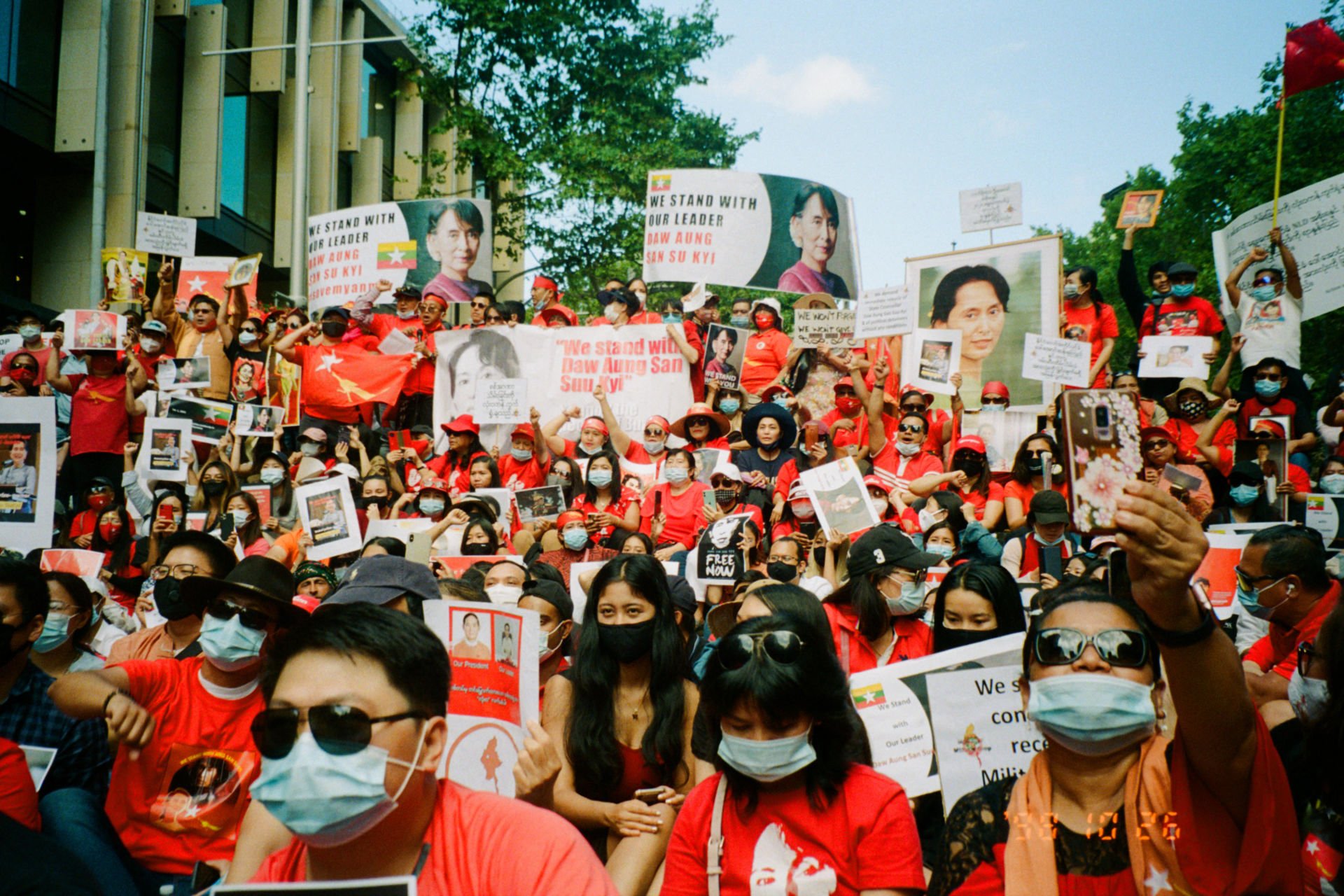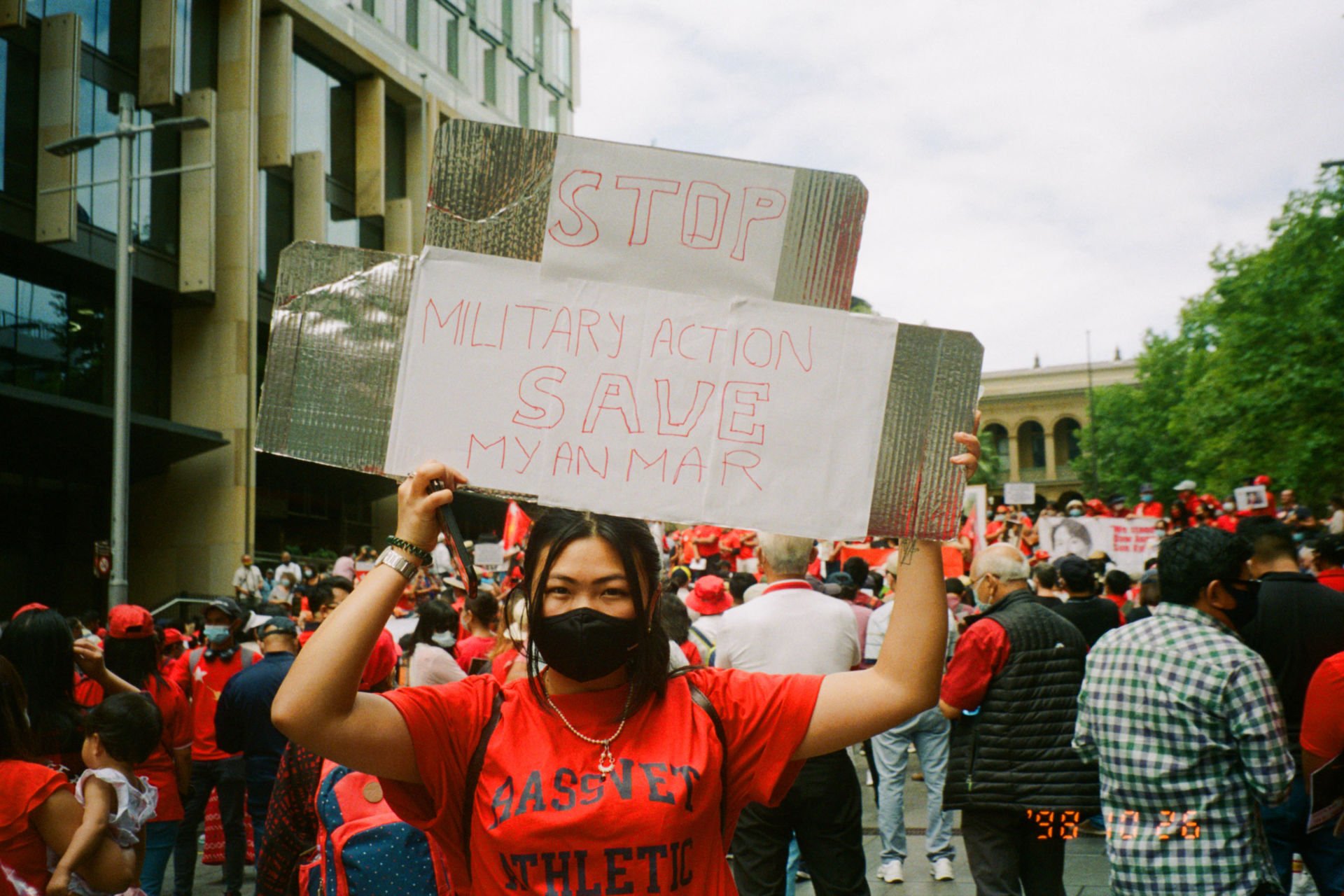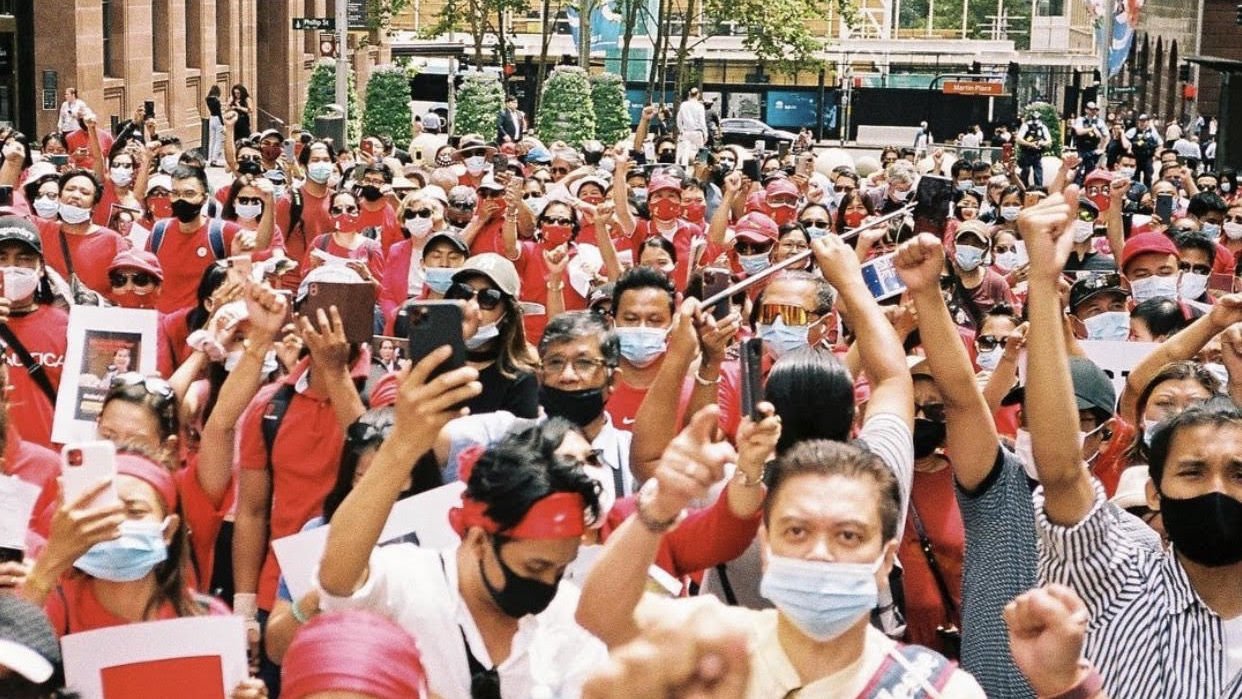As a first-generation Australian-Burmese, my relationship with my culture and identity was rocky and experiential. There was so much I didn’t like, maybe even hated, about being Burmese and Burmese culture growing up. Thankfully, as I grew older, I began taking an educated, decolonised perspective instead of a resentful one. Still, as someone who was born and raised in Sydney, I overwhelmingly identified as Australian and truthfully, my lived experience can
hardly compare to the culture and society of native Burmese people. I am kept apart, even from my own relatives despite the love we have for each other, by language barriers and starkly different upbringings.
The disconnected tinge is always there. It wasn’t really my problem. My life is here, I thought. Sometimes, I still joke about how adding ‘fluent in Burmese’ on my resume might be useless.
Earlier this year, on February 1, the Tatmadaw (Myanmar’s military) initiated a coup, arresting and detaining de facto leader Aung San Suu Kyi and other National League for Democracy (NLD) government officials following the NLD’s landslide victory in the 2020 Myanmar Elections. The Tatmadaw claimed NLD’s sweep (with >80% of votes) was due to election fraud and stated it was thus ‘necessary’ to revoke the constitution — which they wrote in 2008. It’s clear that the military generals were growing restless with the facade of civilian rule that they themselves had devised. Suddenly, without a day’s notice, soldiers started to patrol the streets, domestic and international internet and broadcast services were shut down, all banks closed, and all flights were cancelled. After the initial outbreak of the news, anger flooded the air in my home. It was almost suffocating. Cousins, aunties, family friends, both in Australia and abroad, expressed their outrage, exasperation, and despair. My family’s reactions remain vivid in my memory.
“How much more must we endure?” said my mum.
“Those evil, evil bastards. What more do they want? What could they possibly gain that is worth the suffering inflicted?” said my brother’s girlfriend. Her expression was pained with worry for her family back home, who were mainly doctors like herself, a high-value target for the military.
“In this day and age?! In 2021?! How could this be happening? We were so close...” These statements were reiterated several times across the dining table and over the phone.
At the time, I could tell it was fucked and I was definitely mad, but I couldn’t quite process or understand the pain everyone felt — the hopelessness in the face of injustice. I mean, but surely, I thought, they won’t get away with this.
They did. UN did fuck all. They expressed their condemnation against General Min Aung Hlaing2, and the military’s coup and ethnic cleansing. But that’s about it. To be fair, in order for the UN to intervene, all five permanent members of the Security Council (the UK, Russia, the US, France, and China) must agree. However, China and Russia stated that would be overstepping. Even though the Tatmadaw is armed with heavy artillery and literal tanks, while civilians are armed with kitchen appliances. This blatant excuse is obviously due to the financial benefits their economies gain by exploiting Burmese workers and resources via the Tatmadaw’s handling. There is indisputable evidence that proves this, and yet, the UN did nothing. Efforts such as economic sanctions were made, but the Tatmadaw’s government is most financially active in China, and therefore would largely remain unaffected by such pressures. In history, it will be shown that the world turned a blind eye.
“Now is not the time for the kind of diplomatic foot-dragging that has long characterised engagement with Myanmar’s extraordinarily abusive military regime.” — Tirana Hassan, Deputy Executive Director and Chief Programs Officer, Human Rights Watch.
In the daunting realisation that this is a battle they must face mostly themselves, the people of Myanmar rallied together to march in peaceful protest. They left school and work, singing and banging pots and pans, commencing the Civil Disobedience Movement (CBD).3 Initiated by healthcare workers who abstained from non-essential work in opposition to the military’s orders, everyone else gradually recognised the precedent and rejected the notion of working under the military government. Sourced from Listen up Myanmar4, here are some of the things the Tatmadaw has done in response:
- Extreme force: deploying heavy artillery (such as sub-machine guns, tear gas, weld screws, snipers, live ammunition etc.) on innocent civilians; killing healthcare and volunteer workers, and destroying their resources to prevent medical aid.
- Unwarranted arrests of civilians: the military police began forcibly entering homes and arresting citizens during the night without warrant or explanation, often returning to the homes of the arrested to tell families to collect their bodies. They also started arresting doctors and other healthcare workers who would not compromise, and replacing them with military ones.
- Released criminals: in order for the military to justify using weapons against civilians, the military armed and drugged more than 23,000 inmates imprisoned for the most heinous crimes (e.g. rape, murder) and released them to incite anarchy across the country. This gave the military the opportunity to stage a coup against the civilians, under the pretense of containing the ‘anarchy’.
- Crimes against women: the military has been routinely and systematically exercising rape, gang rape, and other violent forms of sexual crimes against women, girls, boys, men, and the LGBTQ+ community (largely among ethnic minorities). These crimes often happen during raids of peaceful protests, night arrests, and occupation of rural villages.

These war crimes and violations against human rights instigated the Burmese diaspora across the world to march in solidarity, push for action, and give voice to those back home who have been silenced. But it really angered me. The media. Often scratching the surface at best were articles, but never front page headlines. I swear Western media just loves a good-guy-bad- guy narrative. Western voices constantly speak over Burmese people who are frankly tired of explaining the truth. The smear campaign against Aung San Suu Kyi, framing her to be the figurehead of the Rohyingya genocide is a prime example. Despite the fact that the genocide was executed by the military junta, this has led many people to turn away from what’s currently happening to Myanmar. Suu Kyi never had any real power, just hope. Before any privileged person says something like “Aw, she could’ve spoken out against them instead of denying it...” No, she couldn’t have. Westerners have no notion of how brutal and shameless military dictators can be. If she said anything off script or stepped out of line, the coup would’ve come sooner. There would have been no 2020 election and Suu Kyi would’ve been put under house arrest even earlier, despite already serving decades in detention for her country from 1989 to 2010. The Rohingyas would’ve only continued to suffer from ethnic cleansing, and before you know it, so would more ethnic minority groups in Myanmar. Of course, the Tatmadaw are elitists in every aspect.
My morals were conflicted and I had sad realisations about activism trends. I couldn’t help but feel slightly annoying whenever I posted on social media. Sure, the military’s control over the country’s communications and their threats to anyone who openly opposed them did not make things easy, but I still can’t wrap my head around why no one seemed to care. People are always ready to be activists, fight for what’s right, and repost on their Instagram stories if the cause is trendy enough, but I didn’t receive any responses. There were no signs of solidarity or proactive acts of support from anyone unless I directly spoke to them about it. Then, they would say how sorry they felt and how horrible it was. I know that they’re good people and they meant it, but I also felt like it wasn’t much at all. I couldn’t complain though; what if it was the other way round? I would probably be the same. And I hate that. It’s not the oppression Olympics, I know people are trying their best for what they care about. I had one friend tell me in private that she donated to the cause (despite being broke) and reads everything I post; another friend posted about Myanmar after doing her OWN research to show solidarity with me. I can’t express how monumentally moved I was. I was shocked at how these little things affected me so much. I almost cried. Thank you, Naz and Jess. I really hope to be like you for
all my friends in the future.
But these positive moments were quickly overshadowed by horrifying news from my relatives. My nephew was captured and arrested. My heart dropped so heavily. He’s younger than me, only 19. Pulled away from the crowd. Abused. Detained. I couldn’t even wrap my head around it. He is someone precious to me, and before the coup, I often thought about how he deserved a better life and how I could help him. I still saw him as a little brother, yet I don’t know if I’d have the same strength if our roles were reversed.
“Your Auntie Saw is hiding high school kids in her house right now,” Mum said. “The soldiers are all over the neighbourhood arresting protestors, even in the middle
of the night.”
I couldn’t sleep. I felt so guilty being safe and warm in my own bed. I knew we were so alike, similar in age and interests. I thought about how smart and funny he was, and couldn’t imagine how he was being treated in a cell.
Eventually, he was released. We contacted him as soon as we heard.
“They started treating us fine after a couple days,” he replied, but I think he only said that so my mum wouldn’t be upset. They only treated him and his friends ‘fine’ after forcing them — batons in hand — to delete all their social media posts with information about what was going on or regarding protesting.
My rage peaked. Protest marches became one of my outlets. I would skip work or uni to go to them, along with my whole family, my Burmese friends, and their families. It was so motivating to see all these people from different areas of my life come together for the same cause. In Canberra, we shouted and sang and marched from the Parliament House to the Chinese embassy, chanting at them to “GET OUT!” of our way towards democracy. We demanded that the Aung San Suu Kyi and all political detainees get released, to stop the ethnic cleansing and discrimination, to stop killing our children. The spirit did not dwindle, despite the wind and rain.

“We cannot let them get away with this again! Our people have suffered for over half a century! First, the 1962 Coup!5 Then, the 1988 Coup!6 And now, the 2021 Coup!”
Wow, this has been going on for ages. No wonder the country is finding it so hard to get back up on its feet, I thought with a pang of guilt for having criticised the slow-paced development Myanmar had compared to other Southeast Asian countries.
I was also surprised by the moxie of my parents, leading the chants at the front of the march. I had thought of them as indifferent to politics, too busy surviving to care. I told them I was taken aback by their behaviour since they didn’t say much about my activism in 2020.
“Your activism? What did you do?” they asked. Without mockery. Genuine confusion.
“Oh, you don’t even know, my dear. I was about your age when I fought alongside my friends in the ‘88 Uprising, pregnant with your older sister. Students led the entire movement. But they came down on everyone with tanks. Many students were shot or beaten to death. My friends included.”
“I’m afraid for the youth. Kids these days show no fear. They’re naive. Too influenced by Westerners or Americans who riot and swear at police. Those fuckers in Myanmar will kill you. As blatantly as swatting a fly. Without remorse or consequence.”
It dawned on me. I feel like there’s little that I can do alone, but I’m still willing to do anything. My pride as Burmese is more prominent than ever now. In the back of my mind, I pray. For institutional change. For a political system of equality and self-determination for all ethnic minorities and people of Myanmar. Referred to as ‘The Golden Land’ in travel guides, Myanmar’s decades-long fight for democracy and freedom has far outshined its commercial value in resort locations these recent months.
I live my life regularly, so to my friends and colleagues everything might seem normal, but at home, it’s still not normal. Breaking news and the sounds of shooting guns come from my parents’ phones into my room, the kitchen, the living room. Our calls to our relatives are often urgent and concerning. So, if you have any Burmese peers, please ask how they are. Especially the international students as they are unable to go home and have their families in constant danger. Mental health is also a huge concern as not enough people are aware of this issue and not enough are checking in.
Things have not gotten better. Four months in and the body count still rises exponentially every day. Myanmar is called the Golden land, due to the countless golden stupas and pagodas glittered over its countryside and nestled in its cities. In a way, they represent the endless faith and the labour that went into building the country. The fight goes on and my heart remains heavy. We carry this weight in gold.
Ways to donate to the civilians and anti-coup protestors in Myanmar right now:
• Donate to the Citizen of Burma Award Organization which aims to support the growing civil disobedience movement in the country and abolish the junta dictatorship:
charity.gofundme.com/o/en/campaign/crph
• Donate directly to the Civil Disobedience Movement: cdmmyanmar.org/
• Donate to Myanmar Now’s journalism — an independent journalism outlet reporting on the atrocities being committed from the ground in the country: www.myanmar-now.org/en/donate
• Donate to the Myanmar Student’s Association Australia’s support campaign for CDM:
gofund.me/06e24d62
Pathways and options for Myanmar students facing issues such as expiring visas or seeking safety in Australia. Sourced from Myanmar Students Association Australia 7. Please refer to their Facebook page for detailed tips on these.
• Claiming protection while you are in or outside Australia in the means of Humanitarian and Refugee visas with a subclass (201, 202, 203, 204).
• Claiming protection while you are in Australia in the means of a Protection visa (subclass 866).
• Travel exemption request if you hold a valid visa (student visa etc.)
For more information please contact the following experts online:
• Refugee Advice and Casework Service
• Legal Aid Refugee Service
• Refugee Council Australia
• Asylum Seekers Centre
• Immigration Advice and Rights Centre
UTS also offers free counselling services to all students. If in need of them, priority appointments are available, along with Burmese translators and/or Burmese-speaking counsellor and mental health support groups. Please contact ethnocultural@utsstudentsassociation.org for more information or visit their Facebook page.
1. Myanmar State Counsellor and de facto leader pre-coup. Daughter of General Aung San, who fought for independence from British colonial rule. Won the Nobel Prize in 1991, but her reputation as a human rights champion has been overshadowed in recent years by the Rohingya genocide.
2. A Burmese army general that has served as Chairman of the State Administration Council of Myanmar since the coup. The current de facto leader.
3. A non-violent form of protest in which citizens refuse to adhere to the commands of those in power.
4. Listen Up Myanmar
5. The Tatmadaw under General Ne Win overthrew civilian government and implemented an authoritarian regime, a military dictatorship.
6. Better known as the 8888 Uprising, mass protests underwent to depose Ne Win, only for a new military junta to take his place and launch a bloody massacre of thousands of civilians.
7. Myanmar Students' Association Australia


 -
-